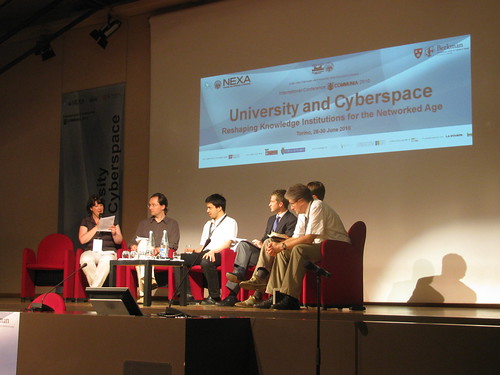Last week I participated in the third (and sadly final!) conference of Communia project, a European thematic network on the digital public domain. The theme of this conference was University and Cyberspace and several of the talks articulated a vision in which universities, academics, and students play a key role in creating, curating and promoting the digital commons.
The panel that I took part in gave an overview of some of the key activities that the Communia project has undertaken — including work that we have been doing on the public domain calculators, which aim to help users find and identify works which are in the public domain in their jurisdiction.
I spoke briefly about the relation between the public domain and open government data — giving a brief introduction to the ‘what’ and ‘why’ of open government data and an overview of some of the many developments since our workshop on reusing public sector content and data in March 2009.
I concluded with two main ‘take-home’ points about open government data, public sector information and the digital public domain in Europe:
-
Broaden the scope of the PSI Directive. The directive does not currently include publicly funded cultural heritage organisations — such as museums or galleries — within its scope. The directive could be broadened to include these kinds of organisations, which might encourage them to open up their content and data for others to reuse. Opening up metadata about works and objects held by publicly funded cultural heritage organisations could be very useful to (i) help establish what is in the public domain in a given jurisdiction (as per the work on the calculators) and (ii) help to bootstrap a new generation of digital services for researchers and for the general public.
-
Broaden the evidence base for opening up PSI. At present the European Commission primarily focuses on the value of PSI in a fairly narrow sense — e.g. citing the MEPSIR and PIRA study estimates of a market size of 27 or 68 billion Euros (respectively). While this kind of evidence is obviously crucial for European policymakers, the Commission should also take into account other potential benefits of opening up PSI, such as improvements to public service delivery, greater accountability of public bodies, the intrinsic value of PSI (e.g. cultural or educational), and enabling the creation of new digital services for citizens. Value is not only about money!

Dr. Jonathan Gray is Lecturer in Critical Infrastructure Studies at the Department of Digital Humanities, King’s College London, where he is currently writing a book on data worlds. He is also Cofounder of the Public Data Lab; and Research Associate at the Digital Methods Initiative (University of Amsterdam) and the médialab (Sciences Po, Paris). More about his work can be found at jonathangray.org and he tweets at @jwyg.









3 thoughts on “Opening up European public sector information: two recommendations”
Comments are closed.